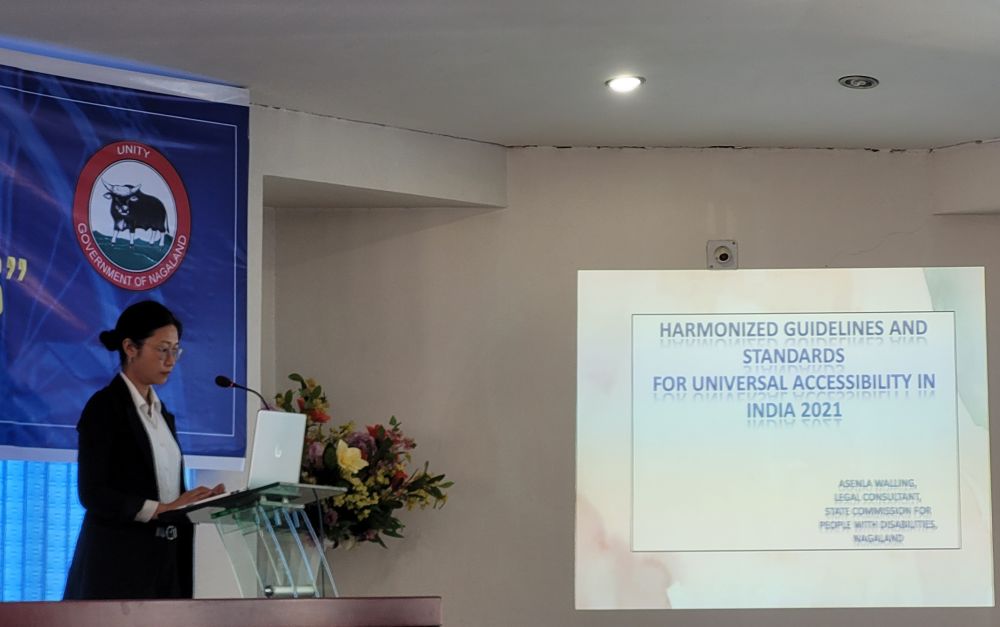
Khriesinuo Kire and Asenla Walling, legal consultants of State Commissioner for Persons with Disabilities (Nagaland).
Our Correspondent
Kohima | August 19
Khriesinuo Kire and Asenla Walling, both legal consultants of State Commissioner for Persons with Disabilities (Nagaland) today talked on ‘Harmonised guidelines and standards for Universal Accessibility in India 2021’ at the sensitisation workshop on Universal Accessibility and Rights of Persons with Disabilities Act, 2016.
The workshop took place at Nagaland Public Work Department (NPWD) conference hall, Kohima.
The Harmonised Guidelines and Standards for Universal Accessibility in India, 2021 was previously known as the Harmonised Guidelines and Space Standards for Barrier-Free Built Environment for Persons with Disabilities and Elderly Persons, 2016.
Earlier, the guidelines were for creating a barrier-free environment, but now, the focus is on Universal Accessibility, said Kire.
The guideline was issued under Section 15 of the Rights of Persons with Disabilities Rules, 2017, as a mandatory document to be implemented for all public building which simply means all built environment open to public (both government establishments and private establishments).
On accessibility framework for built environments, she said the main considerations for accessibility as a universal attribute are: pedestrian access into site, designated vehicular parking near the main entrance, accessible path to the entrance, appropriate external lighting, accessible external furniture (seats, bins, etc), accessible information at the entrance to the site, suitable drop-off point near main entrance, reduced travelling distance, level entrances and exits, simple and logical layouts, unobstructed level circulation, easy access to information desks, lifts and toilet compartments for disabled, spacious lifts, safe stairs that are easy to use and facilitate safe assisted evacuation/rescue in emergencies, slip resistant walking surfaces, good acoustics, hearing enhancement systems, adequate maneuvering space, good lighting, good signage, intuitive, obvious and accessible means of egress and management and maintenance of the built environment etc.
Walling also said that all built environment should be assessed and evaluated for accessibility in three broad domains, i.e., Information systems, infrastructure systems and building management systems.
She said the guideline need to be adopted across all build environment practices of all scales from master planning to building interiors and services.
The guidelines are mandatory for both Government establishment and Private establishment.
The guideline advocate and strongly recommend all built environments to enhance accessibility levels in each building whether existing or new or orient the infrastructure building practices towards universal accessibility, Walling said.
Call for strict implementation of Rights of Persons with Disabilities Act, 2016
Kire said that with context to state of Nagaland and the Rights of Persons with Disabilities Act, 2016, though the notifications were issued, there are hardly any departments who have implemented it “which only goes to show that the Act is not taken seriously for reason best known to them.”
Some changes are seen now a day with lift facilities in public buildings. However, most of the time, it remains non functional. Further, the doors to the lifts are mostly too small that it cannot accommodate a wheelchair user, for which given the priority, the lifts were built for, she said.
“It is ironic to state that there are still officers in high ranking chairs who feel that there is no point in adding lift facilities in the Office buildings as there are no employees who are dependent on wheelchairs or walkers, etc. Such is the mentality of our current state,” Kire said.
It is essential that the Rights of Persons with Disabilities Act, 2016, along with the various National Policies and Schemes be strictly adhered and implemented in consonance with the Harmonized Guidelines & Standard Universal Accessibility, 2021, she said.
“The duty and responsibility lie solely upon the stakeholders- you and me, to take these initial stage in building our society, our State into a Universal Accessible Environment, where not only the persons with disabilities but also the senior citizens along with other vulnerable groups can move around freely, independently and be at par with the populace,” she added.
Earlier, Diethono Nakhro, Nagaland State Commissioner for Persons with Disabilities (PwDs) addressed the workshop as the resource person.
The programme was chaired by Er Hozheto Shikhu, Chief Engineer, PWD (Housing) while welcome address was delivered by Er Pukroneizo Kera, Engineer-in-Chief, NPWD. Vote of thanks was proposed by Temsu Soyah, Senior Legal Advisor, NPWD.







 An orbiting message of peace
An orbiting message of peace The last Konyak headhunters of Nagaland
The last Konyak headhunters of Nagaland What Does Your Face Say About Your Health?
What Does Your Face Say About Your Health? The Top Viral YouTube Videos of 2017
The Top Viral YouTube Videos of 2017










Leave a Reply
Your email address will not be published. Required fields are marked (required)